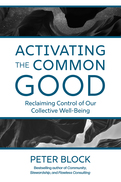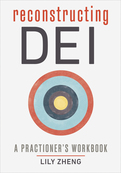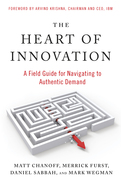CHAPTER 1
What It Means to Embody a Coaching Mindset
When you first learn to coach, you practice applying the core competencies. Then you must trust that you know what to do, forgetting the specifics of the requirements. You coach by heart, not from your head. You get better at this with practice while knowing improvement is a continuous journey.
You must let go of being the perfect coach. Your clients need you to be present more than they need you to ask the perfect question. You don’t have to coach flawlessly to receive and offer back what you think was expressed. When you are wrong and they correct you, you both better understand their thinking. When you trust that you will make a difference for them by creating a safe space to talk while using reflective inquiry as best you can in the moment, you are a good coach.
There is a commonly held idea that you need ten thousand hours of practice to be a master.1 This belief suggests that mastering a skill has an end point. Whether this is true for some skills, in coaching, mastery is an ongoing journey. Deliberate practice makes you better at applying your skills, but how you continually deepen your full-body presence while performing creates the profound results you seek. There is not a path to mastery but a path of mastery.
You develop your mastery as you feel comfortable enough with your skills to let go and ride the ebb and flow of the conversation, receiving and offering back what seems to be the most meaningful elements in what the person shares with you. You receive their words, expressions, and energetic shifts. You offer what you experienced for them to consider. They will have emotional reactions as they examine the construction of their stories, deconstructing what doesn’t serve them and considering new ideas as they come to light. If you stay with them throughout the process, not worrying about the mechanics of your practice, the session will be successful.
They may not have a clear aha moment with you, but they will continue to think about the conversation; the lightbulb may come on in the days that follow. The creative insights that emerge in the moment and over time are the measures of success in coaching.
French philosopher Simon Weil said, “Attention consists of suspending our thought, leaving it detached: empty, and ready to be penetrated . . . waiting, not seeking anything, but ready to receive.”2 Presence then calls on you to release the chatter in your mind to be open to receive what you hear, see, and sense from the people you are with.
You receive what they offer with no judgment. You trust what you offer back for them to consider is worthwhile. When you are curious, caring, and respectful, you are embodying a coaching mindset.
Do You Want to Be Proficient or Profound?
Even when you know how important it is to cultivate a coaching mindset, the increasing obsession of coaches intent on meeting certification requirements or safely following a coaching model undermines this development. Both leaders and coaches I work with find it difficult giving up a trusted script of standard questions and leading coachees to the conclusion they know is best. They miss the magic of being fully with the person in their conversations.
I support the development of skills and expertise. I teach coaching skills and mastering the competencies as defined by the International Coaching Federation (ICF) to coaches and leaders worldwide. Every class I teach includes structural elements of the conversation, but I also emphasize the importance of feeling humble and nonjudgmental while my students apply their technical skills.
It can take months, maybe years, to maintain being fully and sincerely present while developing your conversational competencies. Working on peeling away the grasp of your ego—the practice of unselfing—must be woven into your regular practice. This is your path to mastery.
To be of value to your clients and colleagues, you must seek to be profound with your presence as well as proficient with your skills.
You must trust that whatever level of skill you have right now is enough, knowing breakthroughs can happen anytime you pull yourself out of the interaction. Your focus should never be on what you think about what they share. Your responsibility is to coach them on what they think about what they share with you when you coach them to see their thoughts more broadly, clearly, and objectively.
Practice Unselfing
To expand the awareness of others through coaching, you must release your concept of self. The identity you hold on to today brought you to your current comfort level no matter your level of self-worth. Giving up the value you believe you can provide for others as you have done in the past is not easy. Listening to someone speak without wanting to shape what will transpire takes courage.
Philosopher and novelist Iris Murdoch said that to experience beauty, we must learn the process of “unselfing.”3 Although she writes about unselfing when we commune with nature and contemplate art, I believe you can unself when you sense the sacredness of the human you are with. You release the worry that your value will be judged, freeing yourself of the clutches of your ego. Murdoch said, “Any real understanding of goodness is necessarily an embrace of imperfection.” Only then can you attend to the phenomenon appearing outside yourself.
To unself while coaching, you must believe the energy that connects, aligns, and fosters insights to surface is more powerful when you are not analyzing or considering what to say next. You trust in the magic of the coaching process.
For example, being proficient at the ICF competency of setting an agreement for the conversation means you and your coachees become clear about what they want to have at the end of the conversation. They may say they want to make a decision, determine steps to take, or gain more clarity on their options. Go further. Wonder what it looks like when they make the decision, what they dearly want to create when they take the steps, or what truly is important to them about their desire to choose right now. Don’t use your memory to ask a list of generic questions. Use their words as you explore what they hope for could look like and what making this picture real would mean to them.
Then keep wondering. Sense what they want that they have resisted saying or even formulating. Hear the angst in their words when they describe how they feel slighted by others, what they fear they have lost for good, and what they doubt they can do.
You respect their reactions and accept their grievances as data that will help you both define what is possible to create instead of suffering with what they have now. This will bring them to voice the real outcome they want to achieve.
Unselfing is clearly a good idea but difficult to do. Applying your coaching skills while being present will take patience as you are overcoming a lifetime of distracting mental habits. You must be courageous; standing in the present without thinking can feel unnerving. It can also be magical as you discover you are wiser and more capable than you ever imagined. I have learned that the less I say, the more profound I am. You will be amazed with not only the contentment you feel when you work in the present but also the positive results that show up.
When you observe with an accepting and caring mindset, you will not only be a masterful coach, but you will also have a greater appreciation of life. Take a moment before every conversation you have to consider how you can release your thoughts to witness the awesome uniqueness of the person you are about to engage.
When we unself, we free ourselves of identity, feel the sacredness of the journey, and lose ourselves to the alchemy. There is no anxiety from detaching, no fear of rejection and no need for a satisfying result.
 BREAKTHROUGH COACHING RESOURCE
BREAKTHROUGH COACHING RESOURCE
Unselfing—Becoming Profoundly Present
Self-transformation means we cross over (trans) so something new emerges (formation) in our sense of who we think we are. We must let go of something to give space for what is new. The process of releasing and recognizing is experienced by both you and the client as together you nurture deeper understanding and realizations that light a new way forward.
In order for the client to feel you are there for them and you won’t judge their words or reactions, you must unself by releasing these five mental habits:
1. Needing for the client to find the session valuable
2. Knowing where the conversation will or should go
3. Dwelling in the client’s story and pain
4. Wanting to be appreciated
5. Clinging to being the expert, leader, mentor, problem-solver, or parent
These habits come from wanting to feel good about who you are as their coach. They are fueled by the fears of rejection and insignificance. They block connections and the possibility of transformation.
The collective mind can emerge when the coach releases needs, opinions, and awareness of what is best to happen next. The coach must remain calm and comfortable to sense the experience with the client. Then information can flow into the coach, and the coach can offer it back impartially for clarification and understanding. The spontaneous loop expands thinking. Consciousness lifts for both the coach and client.
Coaching feels easy and graceful when letting the mind run freely in the open, unselfed field. The coach’s presence is strong yet subtle; it is greater than one’s self but doesn’t reduce the self.
It is helpful to develop new mental habits that support unselfing throughout each day. Then before engaging in a coaching conversation, practice the following steps:
1. Open yourself to being a self-less witness—Walk inside or out for ten to fifteen minutes with a quiet mind. Notice your world without your I getting in the way—what you think about what you see. Instead, just notice your experience. What makes you smile, feel curious, or open with gratitude? What colors and details pop out? What are you seeing that you didn’t see the last time you walked in this space? We miss so much when the I that defines our self leads us through life. If thoughts enter your mind, notice if there is anything important to consider, and then let them float away, knowing you can come back to them later. Release your I so you can be with the world around you.
2. Bring your self-less witness into the conversation—Sit comfortably in a chair, exhale fully, and feel your body relaxed but awake. You feel energy moving up and down the center of your body from your gut to the top of your head, simultaneously calming your body while sparking your curiosity. Your entire presence is attuned with this moment.
3. Envision your client as strong, complete, and capable of achieving great things—Your belief that the client is resourceful and not broken or inadequate will raise the level of energy between you, even if they start the conversation doubting themselves.
4. Let courage and love fill your body with warmth—Remember you are a compassionate thinking partner. Your courage will inspire their willingness. Your care and belief in them will activate their confidence. The way forward will emerge as you knew it would all along.







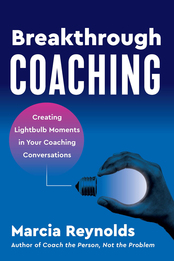
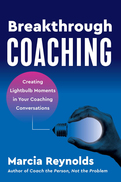
 BREAKTHROUGH COACHING RESOURCE
BREAKTHROUGH COACHING RESOURCE
